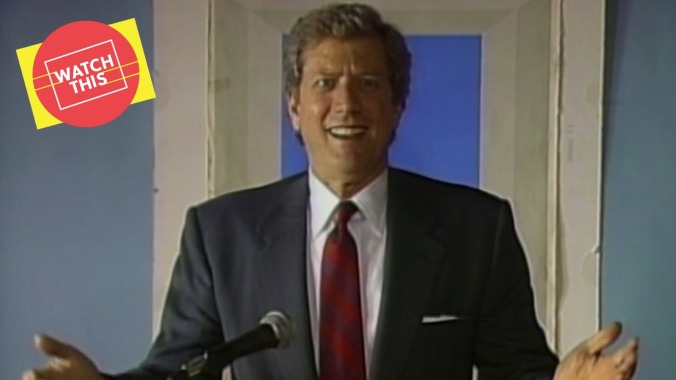Watch This offers movie recommendations inspired by new releases, premieres, current events, or occasionally just our own inscrutable whims. This week: With Jon Stewart’s Irresistible headed for home-viewing platforms—and with November 3 on the horizon—we’re looking back at other films about elections or political campaigns.
Tanner ’88 (1988)
The single most surprising moment in Rolling Thunder Revue, Martin Scorsese’s hybridized 2019 account of Bob Dylan’s 1975 concert tour, is when Jack Tanner suddenly appears as a talking head. Though he’s credited in the film as “The Politician,” any fan of Robert Altman’s 1988 miniseries Tanner ’88 will recognize actor Michael Murphy’s indelible portrait of the fictional Congressman-turned-presidential-candidate. What’s remarkable isn’t that Scorsese uses Murphy-as-Tanner to throw the whole notion of “truth” into question, i.e., how the legend of Dylan has just as much sway as the facts. It’s that the character of Jack Tanner has been intermittently employed for that exact same purpose for over 30 years.
Ahead of the 1988 Democratic presidential primaries, HBO reached out to Doonesbury cartoonist Garry Trudeau to create a fictional candidate to run alongside the real ones. Trudeau would only sign on to the project if HBO could get Altman, his “boyhood hero,” to direct. Altman agreed and together they invented Jack Tanner, a Baby Boomer liberal with a telegenic, Kennedy-esque physique who could conceivably compete against Michael Dukakis and Jesse Jackson. Murphy’s genial disposition and warm personality were instrumental to his viability as a fictional candidate, but they also helped endear him to real politicians, media personalities, and operatives with whom he hobnobbed during the primaries. Everyone quickly caught on to Altman and Trudeau’s game, and many subsequently played along by providing cameos throughout the series. In the beginning, however, Murphy and a young Cynthia Nixon, who played Tanner’s impassioned daughter, fooled people like Pat Robertson and Gary Hart into believing that he was “for real” (the cheeky slogan for Tanner’s campaign). A nice smile and a firm handshake go a long way in politics.
The primary satirical drive of Tanner ’88 was to illustrate how the modern media fully shapes and controls the public’s perception of politicians—that acting like a candidate is arguably more important than actually being qualified. (One of Altman’s best visual jokes was to run most of the episode’s title sequence over reflective surfaces to underscore that superficiality is the show’s target.) If that insight has slightly dated in the interim decades, it’s only because we now accept that flash is all but equivalent to substance in the political arena. Tanner’s continued presence during the primaries arguably reflected most poorly on the tepid crop of that year’s Democratic nominees, but it also showed just how far image alone can keep a man in the news.
The series’ defining irony is that Tanner never really says much of anything beyond bland platitudes. (His off-the-cuff, substance-free monologue that concludes the first episode is the longest he speaks without being interrupted.) It was crucial for Murphy to play the character as an inviting blank slate in order to gain the trust and comfort of actual political figures, like former Governor Bruce Babbitt, who appears in the series after he dropped out of the race to give advice to Tanner on how to run a meaningful campaign. But it mostly allowed the character to be a living, breathing interpreter of the news around him. Altman and Trudeau improvised and invented material on the fly throughout the primary season to reflect the ever-changing news cycle (the director described the series as “two-thirds scripted and one-third found art”), but Tanner always remained the same. The unofficial rule was that things happen to Tanner, but Tanner rarely if ever makes things happen.
In 2020, Tanner ’88 frequently plays like a time capsule of an analog, monocultured time in American politics, when the evening news was more prominent than Twitter. However, you can plainly see the influence the series has had on pop culture’s depiction of campaign politics. For one thing, the larger ensemble is filled with now archetypal figures: the veteran campaign manager (Pamela Reed), the overeager media consultant (Daniel Jenkins), the resident statistician (Jim Fyfe), the ditzy assistant turned fiercely competent aide (Ilana Levine), the cameraman with arty ambitions (Matt Molloy), and so forth. This extends to Tanner ’88’s depiction of the press as hangers-on eager for the latest scoop, inextricably tied to access and the fickle whims of the campaign, desperate to psychoanalyze candidates when there’s no other information available. The West Wing, though more transparently idealistic, simply does not exist without this series.
Similarly, Altman and Trudeau’s depiction of the presidential campaign as an ecosystem in flux, filled with many organisms competing for the public’s attention and controlled by the media’s framing of events, remains potent and evergreen. Early in the series, Tanner meets with many real high-profile political consultants and journalists who advise him on next steps in his campaign, like how to define himself against other candidates and deepen his relationship with the public at large. Their advice, while probably accurate, is more or less indistinguishable than anything a contemporary pundit said during this year’s primary season. The takeaway is clear: The horserace never actually ends; it’s only the horses that change.
Availability: Tanner ’88—which is a TV miniseries, not a movie—is currently streaming on HBO Max and can be purchased digitally on Amazon.









































